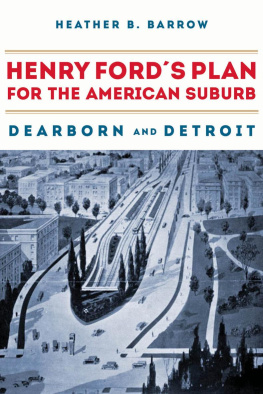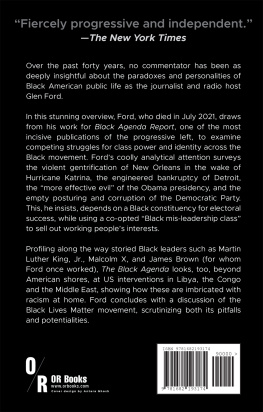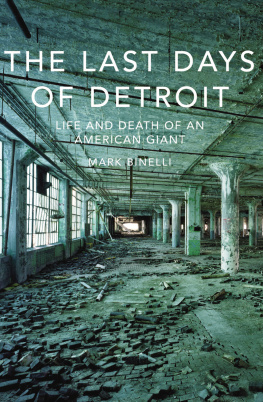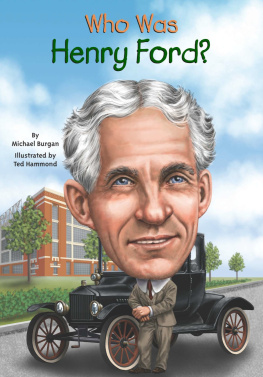Acknowledgments
The Making of Black Detroit in the Age of Henry Ford , a history of a community in formation, could not have been written without the generous contributions of a community of scholars, activists, scholar-activists, archivists, autoworkers, colleagues, family, and friends. While I cannot possibly recognize all who helped make this effort possible, I want to name a few who helped me along the way.
I am indebted to all the scholars who have studied the history of African Americans in Detroit as well as Henry Fords influence on the city. Many of the published and unpublished works on these two subjects are cited in my bibliography. One group bears special mention for rescuing me when I hit a wall trying to grasp Henry Fords racial policies. The pioneering research of economic historians Christopher Foote, Thomas Maloney, Warren Whatley, and Gavin Wright, working with data from the Ford Motor Company, clarifies the true nature of Fords compensation policies for black workers. This book has greatly benefited from their research efforts.
My interest in this topic grew out of the experience of living and working in Detroit, especially teaching African American history in the Department of Africana Studies at Wayne State University. Seeds for the project were planted in my history classes as I grappled with what had been going on in early twentieth-century black Detroit and tried to reconcile the written record with what I was learning from interviews with veterans of Detroits labor struggles, including General Baker, Grace Lee Boggs, Mike Hamlin, David Moore, and Quill Pettway. Seminars sponsored by Walter Edwards, director of the Humanities Center at Wayne State University, allowed the seeds to germinate and led to a Working Groups grant, making it possible for Professors L. Todd Duncan, Kathryne V. Lindberg, and me to interview race and labor activists for our project, Detroit Voices.
Once my questions were formulated and my research was under way, many archivists helped with materials. In Detroit, the staff of the Archives for Labor and Urban Affairs at the Walter P. Reuther Library never failed to amaze me with their dedication and efficiency, locating not only what I requested, but other materials related to my topic as well. In this regard, thanks go especially to Tom Featherstone, Louis Jones, William Lefevre, and Mary Wallace. Mark Bowen successfully conducted numerous, invaluable searches in the basement of the Burton Historical Collection, often for mere shards of evidence without which it would have been impossible to document the formation of the black community during the 1920s. Karen L. Jania and Malgosia Myc were extremely helpful with my searches at the Bentley Historical Library. Thanks also go to Peter Kalinski at the Benson Ford Research Center and the librarians and archivists at the Labadie Archives and the reference desk of Harlan Hatcher Graduate Library of the University of Michigan. Among the efficient staff of the Purdy/Kresge Library of Wayne State University, Markeesha Barnett and Regan Rodriguez deserve special recognition for helping me locate materials.
In addition to those mentioned above, a community in the larger Detroit area dedicated to preserving its history provided connections and suggestions that have proved invaluable. Special appreciation goes out to Marti Alston, David Arsen, Steve Babson, Melba Boyd, Ron Brown, John Bukowczyk, Angela Dillard, Todd Duncan, Elizabeth Faue, Carol Forsythe, David Goldberg, Robert Hensleigh, Larry John, Tom Klug, Marian Kramer, Scott Kurasige, Lilian Lai, Maggie Levenstein, Beth and Bruce Morrow, Rudy Nelson, Charles Simmons, and Stephen Ward. I also want to acknowledge the recent loss of three intrepid souls who dedicated their lives to preserving Detroits past. The work and collegiality of Tom Featherstone, Kathryne Lindberg, and David Moore enriched this book and my life in countless ways.
As the project was taking shape, I was fortunate to have had questions, suggestions, and reactions from colleagues who commented on drafts, conference papers, and other fragments that later became part of the whole. To Martha Biondi, Grace Lee Boggs, Melba Boyd, Alan Brinkley, Matthew Countryman, Angela Dillard, Todd Duncan, Tami Friedman, Maggie Levenstein, David Levering Lewis, Robert Self, Fran Shor, Robyn Spencer, Thomas Sugrue, Pat Sullivan, Cynthia Taylor, Jeanne Theoharis, Stephen Ward, Calvin White, Victoria Wolcott, and Komozie Woodard I extend special thanks. I am especially grateful to Timothy Bates, Eric Foner, David Goldberg, and Quill Pettway, who took valuable time away from their busy schedules to read the complete manuscript. Their suggestions were indispensable and helped me bring the parts and the whole into better alignment as I entered the final phase.
I am very glad this manuscript caught the eye of Chuck Grench, who launched the project at the University of North Carolina Press, and has guided it through its various mutations, providing necessary encouragement and patience at every turn. Katy OBrien helped me at an early stage, and Sara Cohen has carried the project forward, answering questions both technical and literary on a moments notice. My thanks go to Dino Battista, Jennifer Hergenroeder, Beth Lassiter, and Ron Maner for their assistance. The final product has benefited enormously from the wisdom and advice of Paul Betz, who shepherded the manuscript through its final stage. Eric Arnesen and Steven Reich, readers for the Press, reviewed the manuscript with great care, offering extremely constructive suggestions for revisions. The book is much better thanks to their collective scholarly critiques.
My greatest debt is to Timothy Bates, who believed in the project from its inception, cheered me on during protracted periods of research and writing, critiqued several drafts, and kept me focused and fit to the finish. This book is dedicated to Tim for devoting his professional career to research that has led to the removal of some of the barriers to equal economic opportunity. The fact that his expertise is in such demand today is a reminder to us all that the struggle for racial and economic justice, documented in this book, is far from finished nearly a century later.











